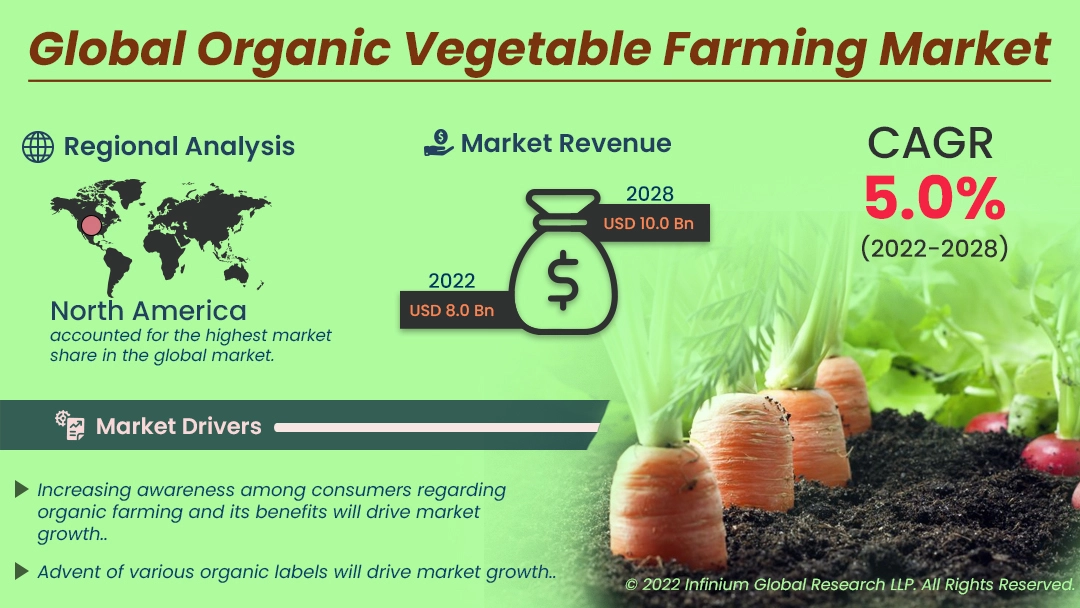Organic Vegetable Farming Market (Type - Pure Organic Farming, and Integrated Organic Farming; Method - Soil Management, Weed Management, Polyculture, and Others; Crop Type - Leafy Greens, Marrow, Root, and Others): Global Industry Analysis, Trends, Size, Share and Forecasts to 2028
A recent report published by
Infinium Global Research on the organic vegetable farming market provides in-depth
analysis of segments and sub-segments in the global as well as regional organic
vegetable farming market. The study also highlights the impact of drivers,
restraints, and macro indicators on the global and regional organic vegetable
farming market over the short term as well as long term. The report is a
comprehensive presentation of trends, forecast and dollar values of the global
organic vegetable farming market. According to the report, the global organic
vegetable farming market is projected to grow at a CAGR of nearly 5% over the
forecast period of 2022-2028.
Market Insight
The organic vegetable farming market was valued at about USD 8 Billion in 2022 and is expected to reach over USD 10 Billion in 2028, with a CAGR of nearly 5% during the forecast period. The use of synthetic chemicals in fertilizers and pesticides has increased over the past few years. Many of these synthetic chemicals are found to have negative effects on human health and the environment. To avoid such negative effects of synthetic chemicals, farmers and agriculture product manufacturers have turned to natural products that have no side effects. Moreover, farming with the help of these natural fertilizers and pesticides is referred to as organic farming. Agriculture produced from natural farming is believed to have several health benefits compared to chemical farming produce. Furthermore, as the demand for organic farming has increased, many traditional agriculture businesses have begun to offer organic products and farming solutions.

The increasing awareness among
consumers regarding organic farming and its benefits is majorly driving the
growth of the organic vegetable farming market. Several research studies have
found the negative effect of chemical fertilizers and pesticides on human
health and the environment. Many consumers have become aware of these side
effects of chemical fertilizers and are opting for organic foods. Moreover, the
advent of various organic labels has further augmented the growth of the
organic vegetable farming market. Several public organizations grant organic
certified labels to the companies and their products. These labels assure the
consumers that the products are grown organically on farms, increasing their
trust in the products. However, the higher prices of organic vegetables
compared to traditional vegetables are majorly hampering the market growth.
Nevertheless, planning several government initiatives to promote organic
farming is anticipated to offer growth opportunities to the market.
The COVID-19 pandemic had a fairly
positive impact on the organic vegetable farming market. The spread of COVID-19
surged awareness among people about a healthy lifestyle including physical
exercise, a healthy diet, and a healthy daily routine. Moreover, consumers
turned to nutritious food in order to build their immunity. The synthetic
chemicals present in food are believed to have negative health effects on
immunity. Thus, consumers avoided foods with synthetic chemicals in them. Many
of them turned to organic foods owing to their perceived health benefits.
Furthermore, many governments across the world offered monetary stimulus for
the agriculture sector. This, in turn, encouraged the farmers to grow organic
produce, driving the organic vegetable farming market.
In terms of region, the global
organic vegetable farming market is segmented into North America, Europe,
Asia-Pacific, and the Rest of the World. North America, among the regions,
accounted for the highest market share in the global market. The domination of
North America is mainly attributed to the growing awareness regarding organic
farming among consumers. Moreover, the higher income and higher spending
capacity of the consumers in the region are further augmenting the market
growth in North America. Furthermore, the presence of several labeling agencies
and regulatory bodies in place is likely to support the dominance of North
America in the global organic vegetable farming market. On the other hand, the
Asia-Pacific global organic vegetable farming market is expected to grow with
the fastest CAGR among the regions. This is due to the government initiatives
to promote organic farming.
Segment Covered
The report on global organic
vegetable farming market covers segments such as type, method, and crop type.
On the basis of type, the sub-markets include pure organic farming, and
integrated organic farming. On the basis of method, the sub-markets include
soil management, weed management, polyculture, and others. On the basis of crop
type, the sub-markets include leafy greens, marrow, root, and others.
Companies Profiled:
The report provides profiles of
the companies in the market such as AeroFarms, Plenty Unlimited, Organic
Farmers, Green Organic Vegetables, Planteneers, Nature’s Path Foods, OrgaSatva
Foods, Naturz Organics, AGRO FOOD Lebensmittel, and Picks Organic Farm.
Report Highlights:
The report provides deep insights
into the demand forecasts, market trends, and micro and macro indicators. In
addition, this report provides insights into the factors that are driving and
restraining the growth in this market. Moreover, The IGR-Growth Matrix analysis
given in the report brings an insight into the investment areas that existing
or new market players can consider. The report provides insights into the
market using analytical tools such as Porter's five forces analysis and DRO
analysis of organic vegetable farming market. Moreover, the study highlights
current market trends and provides forecast from 2022-2028. We also have
highlighted future trends in the market that will affect the demand during the
forecast period. Moreover, the competitive analysis given in each regional
market brings an insight into the market share of the leading players.
